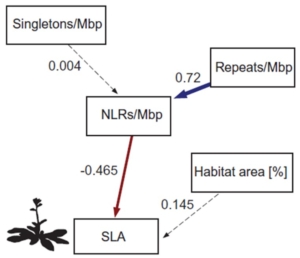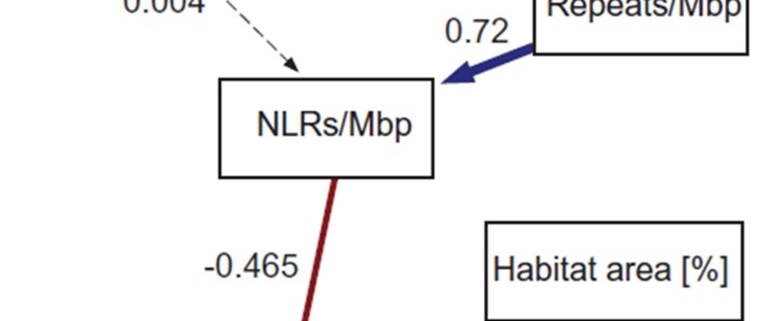A trade-off between investment in molecular defense repertoires and growth in plants
 The reduction in crop yields caused by pathogens and pests poses a significant challenge to global food security. Genetic engineering, aimed at strengthening plant defense mechanisms, offers a cost-effective solution for disease control. However, this approach often comes with a growth penalty, commonly referred to as the growth-defense trade-off. Despite extensive research, the precise molecular mechanisms underlying this phenomenon remain incompletely understood. A recent breakthrough by Giolai and Laine highlights the importance of intra- and interspecific variation in observing the growth-defense trade-off. By analyzing the relationship between R-gene density and growth traits, the authors demonstrated that elevated genomic R-gene density is negatively associated with growth in wild plants but not in agricultural or domesticated plants. This finding suggests that maintaining diverse defense repertoires shapes R-gene evolution in wild plant species, balancing growth and defense to maximize fitness and survival. However, this life-history-driven variation appears to be highly sensitive to domestication, underscoring the profound impact of agricultural practices on plant evolutionary dynamics. (Summary by Ching Chan @ntnuchanlab) Science 10.1126/science.adn2779
The reduction in crop yields caused by pathogens and pests poses a significant challenge to global food security. Genetic engineering, aimed at strengthening plant defense mechanisms, offers a cost-effective solution for disease control. However, this approach often comes with a growth penalty, commonly referred to as the growth-defense trade-off. Despite extensive research, the precise molecular mechanisms underlying this phenomenon remain incompletely understood. A recent breakthrough by Giolai and Laine highlights the importance of intra- and interspecific variation in observing the growth-defense trade-off. By analyzing the relationship between R-gene density and growth traits, the authors demonstrated that elevated genomic R-gene density is negatively associated with growth in wild plants but not in agricultural or domesticated plants. This finding suggests that maintaining diverse defense repertoires shapes R-gene evolution in wild plant species, balancing growth and defense to maximize fitness and survival. However, this life-history-driven variation appears to be highly sensitive to domestication, underscoring the profound impact of agricultural practices on plant evolutionary dynamics. (Summary by Ching Chan @ntnuchanlab) Science 10.1126/science.adn2779




